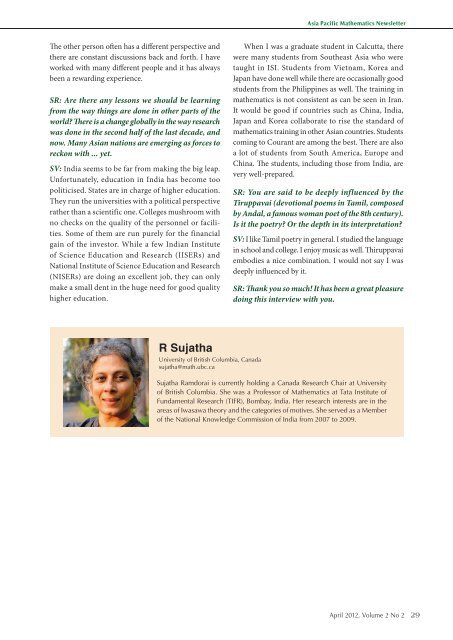Mathematics Newsletter
Mathematics Newsletter
Mathematics Newsletter
You also want an ePaper? Increase the reach of your titles
YUMPU automatically turns print PDFs into web optimized ePapers that Google loves.
The other person often has a different perspective and<br />
there are constant discussions back and forth. I have<br />
worked with many different people and it has always<br />
been a rewarding experience.<br />
SR: Are there any lessons we should be learning<br />
from the way things are done in other parts of the<br />
world? There is a change globally in the way research<br />
was done in the second half of the last decade, and<br />
now. Many Asian nations are emerging as forces to<br />
reckon with ... yet.<br />
SV: India seems to be far from making the big leap.<br />
Unfortunately, education in India has become too<br />
politicised. States are in charge of higher education.<br />
They run the universities with a political perspective<br />
rather than a scientific one. Colleges mushroom with<br />
no checks on the quality of the personnel or facilities.<br />
Some of them are run purely for the financial<br />
gain of the investor. While a few Indian Institute<br />
of Science Education and Research (IISERs) and<br />
National Institute of Science Education and Research<br />
(NISERs) are doing an excellent job, they can only<br />
make a small dent in the huge need for good quality<br />
higher education.<br />
R Sujatha<br />
University of British Columbia, Canada<br />
sujatha@math.ubc.ca<br />
Asia Pacific <strong>Mathematics</strong> <strong>Newsletter</strong><br />
When I was a graduate student in Calcutta, there<br />
were many students from Southeast Asia who were<br />
taught in ISI. Students from Vietnam, Korea and<br />
Japan have done well while there are occasionally good<br />
students from the Philippines as well. The training in<br />
mathematics is not consistent as can be seen in Iran.<br />
It would be good if countries such as China, India,<br />
Japan and Korea collaborate to rise the standard of<br />
mathematics training in other Asian countries. Students<br />
coming to Courant are among the best. There are also<br />
a lot of students from South America, Europe and<br />
China. The students, including those from India, are<br />
very well-prepared.<br />
SR: You are said to be deeply influenced by the<br />
Tiruppavai (devotional poems in Tamil, composed<br />
by Andal, a famous woman poet of the 8th century).<br />
Is it the poetry? Or the depth in its interpretation?<br />
SV: I like Tamil poetry in general. I studied the language<br />
in school and college. I enjoy music as well. Thiruppavai<br />
embodies a nice combination. I would not say I was<br />
deeply influenced by it.<br />
SR: Thank you so much! It has been a great pleasure<br />
doing this interview with you.<br />
Sujatha Ramdorai is currently holding a Canada Research Chair at University<br />
of British Columbia. She was a Professor of <strong>Mathematics</strong> at Tata Institute of<br />
Fundamental Research (TIFR), Bombay, India. Her research interests are in the<br />
areas of Iwasawa theory and the categories of motives. She served as a Member<br />
of the National Knowledge Commission of India from 2007 to 2009.<br />
April 2012, Volume 2 No 2 29


